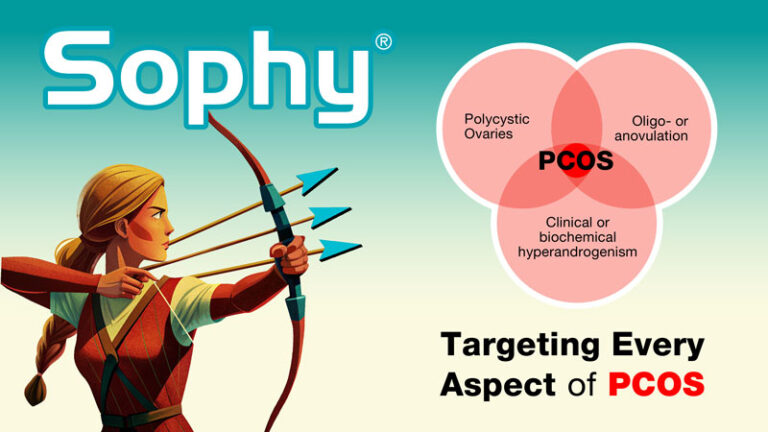
Natural Supplement for PCOS: How Sophy® May Outshine Inositols as a Comprehensive Solution
There is growing interest in natural supplement for PCOS like Inositols and Berberine.
Inositols help improve insulin sensitivity, but may not be effective for all.
Berberine, particularly in its enhanced form as Berberine Phytosome®, offers broader benefits by improving insulin sensitivity, reducing androgen levels, and enhancing ovulation. This makes Sophy®, a unique clinically studied supplement featuring Berberine Phytosome®, a promising option for managing various aspects of PCOS.
Understanding PCOS and Exploring Natural Alternatives: Inositol and Berberine
Polycystic Ovary Syndrome (PCOS) is a complex condition characterized by hormonal imbalances, metabolic challenges, and inflammation. These issues often result in a range of distressing symptoms, including:
- Hyperandrogenism and Hirsutism: Elevated levels of male hormones, leading to excessive hair growth.
- Oligo/Anovulation: Irregular or absent ovulation.
- Ovarian Cysts: The presence of multiple cysts in the ovaries.
The treatment of PCOS typically focuses on addressing specific symptoms and often involves a combination of lifestyle changes and medications. Some of the most commonly prescribed medications for managing PCOS include contraceptive pills, clomiphene, metformin, letrozole, and gonadotropins.
However, many women are concerned about the effectiveness of these medications in managing PCOS symptoms, as well as their potential side effects and long-term implications. As a result, there is a growing interest in natural alternatives and supplements that might offer a safer and more holistic approach. That’s why in recent years, Inositols and, more recently, berberine have gained global attention for their potential in treating PCOS.
Berberine vs. Inositols: A Comprehensive Approach to Managing PCOS
Inositols are naturally occurring compounds that are part of the B-vitamin complex. They are commonly used as a supplement for managing PCOS primarily because they help increase insulin sensitivity. However, according to a significant review published in 2020 in a journal of the Cell Press group, “in 30%–40% of PCOS patients, inositols failed to significantly improve the metabolic and hormonal parameters and to restore ovulation” (source).
In contrast, berberine, a bioactive compound derived from various plants, particularly those in the Berberis genus, offers multiple beneficial actions in addressing PCOS, and this is a great advantage in tackling a problem which is a complex ensemble of different symptoms—a vicious cycle whose origin is not completely known.
Like inositols, berberine improves insulin sensitivity, but it does so through the activation of AMP-activated protein kinase (AMPK), which promotes glucose uptake into cells and lowers blood sugar levels, which is crucial for combating one of the primary factors of PCOS: insulin resistance.
Beyond its effects on insulin, berberine has several other intriguing benefits, particularly its peculiar anti-androgenic action, as detailed in an interesting 2021 study (source). The mechanisms behind this action include:
- Increased Levels of SHBG (Sex Hormone Binding Globulin): Berberine stimulates the production of SHBG, a protein that binds to androgens, thereby reducing the amount of free testosterone in the blood. This reduction helps alleviate symptoms of hyperandrogenism, such as hirsutism and acne.
- Direct Inhibition of Androgen Synthesis: Berberine reduces androgen production at the ovarian level, counteracting the hyperandrogenism characteristic of PCOS.
- Suppression of Androgen Receptors: Berberine decreases the expression of androgen receptors, limiting the effect of male hormones on the body.
Additionally, berberine improves lipid profiles by increasing the expression of LDL receptors and reducing cholesterol absorption. This is particularly beneficial for PCOS patients who often struggle with dyslipidemia. Berberine also exhibits anti-inflammatory effects, which can help reduce the chronic low-grade inflammation commonly associated with PCOS.
What makes berberine particularly advantageous is that the combination of its anti-androgenic effects and improved insulin sensitivity leads to better menstrual cycle regulation, promoting ovulation. This is crucial because a major symptom of PCOS is fertility issues caused by hormonal imbalances that disrupt ovulation—without ovulation, conception is impossible. Fortunately, berberine can help address this problem.
These mechanisms make berberine, especially in its enhanced form as Berberine Phytosome®, a comprehensive therapeutic option for tackling various aspects of PCOS.
Berberine Phytosome®: Overcoming Absorption Challenges
One of the main challenges with traditional berberine is its low intestinal absorption due to the P-glycoprotein (P-gp) efflux pump.
Sophy® leverages the potential of Berberine Phytosome® that increases the biological activity and duration of action of berberine.
In the phytosome form, berberine is complexed with phospholipids, which enhance the lipophilicity of the formulation, thereby improving berberine’s absorption. Additionally, the inclusion of pea proteins and standardized grape seed extract helps counteract P-glycoprotein inhibition.
As demonstrated in a pharmacokinetic study on healthy human volunteers, Berberine Phytosome® is ten times more bioavailable than standard berberine (source). This enhanced bioavailability makes Sophy® a more effective option for managing PCOS and its associated symptoms.
The comprehensive approach of Sophy® in addressing multiple facets of PCOS sets it apart as a superior option compared to other treatments. This distinction is one of the key reasons Sophy® was honored as the Best Finished Product of the Year 2024 in the “Botanicals” category at the NutraIngredients Awards. To learn more, please read here.
